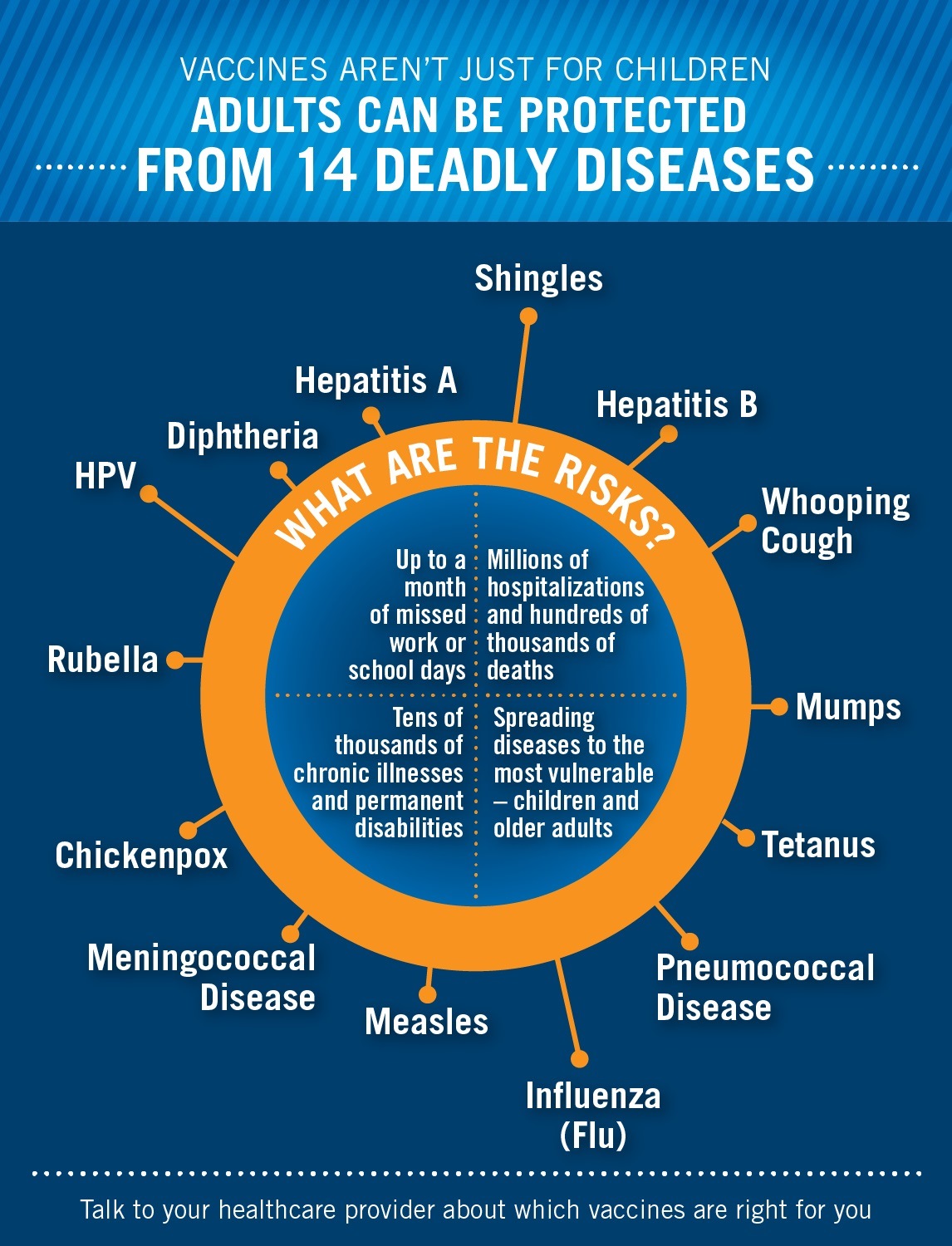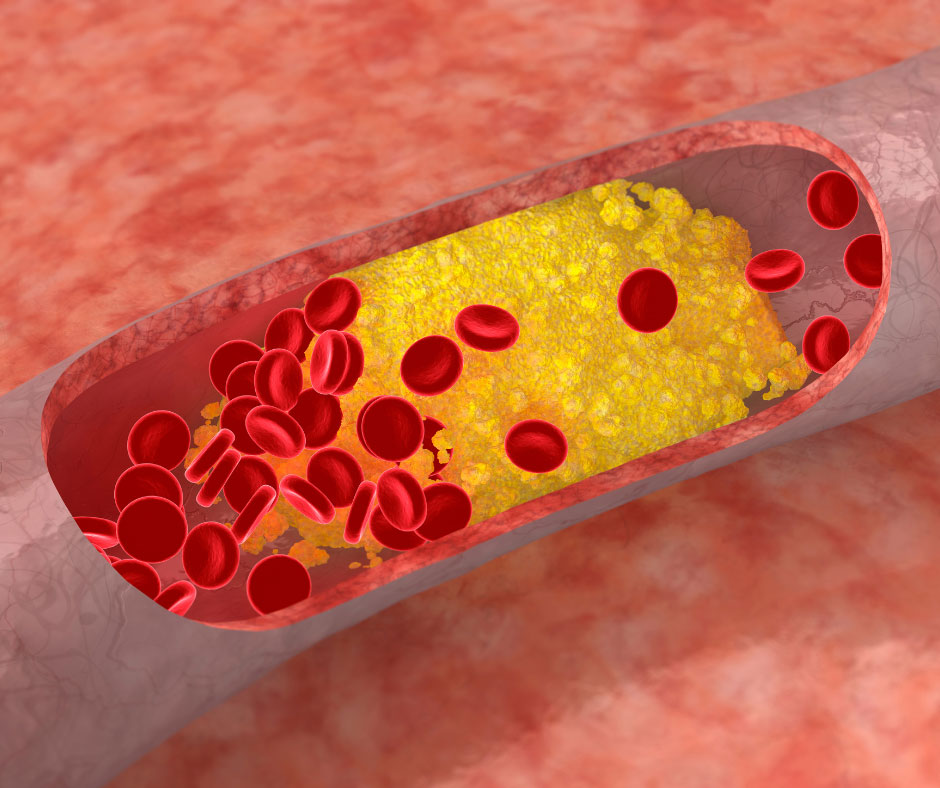Before you know it, winter and flu season will be here. Each year thousands of adults in the United States get sick from diseases that are could be prevented by vaccines. Heart disease can make it harder for you to fight off certain diseases, and those with heart disease or who have suffered stroke are at a higher risk for contacting certain vaccine-preventable diseases, like the flu. If you have cardiovascular disease, talk with your doctor about making sure your vaccinations are up-to-date.
Why are Vaccines Important?
- Vaccine-preventable diseases haven’t gone away. The viruses and bacteria that cause illness and death still exist and can be passed on to those who are not protected by vaccines. In a time when people can travel across the globe in just one day, it’s not hard to see just how easily diseases can travel too.
- Vaccines will help keep you healthy. The Centers for Disease Control and Prevention (CDC) recommends vaccinations throughout your life to protect against many infections. When you skip vaccines, you leave yourself vulnerable to illnesses such as shingles, pneumococcal disease, influenza, and HPV and hepatitis B.
- Vaccines are as important to your overall health as diet and exercise.
Like eating healthy foods, exercising, and getting regular check-ups, vaccines play a vital role in keeping you healthy. Vaccines are one of the most convenient and safest preventive care measures available. - Vaccination can mean the difference between life and death. Vaccine-preventable infections are dangerous. Every year, approximately 50,000 US adults die from vaccine-preventable diseases in the US.
- Vaccines are safe. The US has the best post-licensure surveillance system in the world making vaccines extremely safe. There is extraordinarily strong data from many different medical investigators all pointing to the safety of vaccines. In fact, vaccines are among the safest products in all of medicine. Vaccines are one of the safest ways for you to protect your health, even if you are taking prescription medications. Vaccine side effects are usually mild and go away on their own. Severe side effects are very rare.
- Vaccines won’t give you the disease they are designed to prevent. You cannot “catch” the disease from the vaccine. Although some vaccines contain “killed” virus, it is impossible to get the disease from them. Others have live, but weakened, viruses designed to ensure that you cannot catch the disease.
- Young and healthy people can get very sick, too. Infants and the elderly are at a greater risk for serious infections and complications in many cases, but vaccine-preventable diseases can strike anyone. If you’re young and healthy, getting vaccinated can help you stay that way.
- Vaccine-preventable diseases are expensive. An average influenza illness can last up to 15 days, typically with five or six missed work days.
- When you get sick, your children, grandchildren and parents are at risk, too. A vaccine-preventable disease that might make you sick for a week or two could prove deadly for your children, grandchildren, or parents if it spreads to them. When you get vaccinated, you’re protecting yourself and your family. For example, adults are the most common source of pertussis (whooping cough) infection in infants, which can be deadly in infants.
- Your family and coworkers need you. In the US each year, millions of adults get sick from vaccine-preventable diseases, causing them to miss work and leaving them unable to care for those who depend on them, including their children and/or aging parents.
Vaccines for Adults:
- Influenza (Flu) Vaccine: This immunization helps protect against seasonal flu viruses. Flu viruses are always changing, so the flu vaccines are updated every year. Protection lasts up to a year for each flu vaccine type. People with heart disease or who had had a stroke are at high risk of developing complications from influenza.
- Pneumococcal Vaccination: This vaccination can prevent some of the serious complications of pneumonia, such as infection in the bloodstream (bacteremia) or throughout the body (septicemia). Each year in the United States, pneumococcal disease causes thousands of infections, such as meningitis, bloodstream infections, pneumonia, and ear infections. Those who have heart disease should be vaccinated against pneumococcal disease.
- TDaP Vaccine: This vaccine protects against tetanus, diphtheria and pertussis (whooping cough). Tetanus and diphtheria shots need to be repeated every 10 years throughout adulthood in order to keep your immunity.
- Zoster Vaccine: If you are 60 years or older, you should get a one-time dose of this vaccine to protect against shingles. In the U.S., currently 1 million people get shingles every year, and about one out of every three people will get shingles in their lifetime. Shingles is a painful rash that usually develops on one side of the body, often the face or torso. The rash forms blisters that typically scab over in 7 to 10 days and clears up within 2 to 4 weeks. However, for some people the pain can last for months or even years after the rash goes away. This long-lasting pain is called post-herpetic neuralgia (PHN), and it is the most common complication of shingles.
Getting Vaccinated:
Vaccinations are readily available and adults can get vaccinated at doctors’ offices, pharmacies, workplaces, community health clinics, health departments and other locations. Click here to find a place near you to get a vaccine. Most health insurance plans cover recommended vaccines. Check with your insurance provider for details and for a list of vaccine providers covered by your plan. If you do not have health insurance click here to learn more about health insurance options.
Sources:
Centers for Disease Control and Prevention:
https://www.cdc.gov/vaccines/adults/rec-vac/health-conditions/heart-disease.html
National Foundation for Infectious Diseases:










